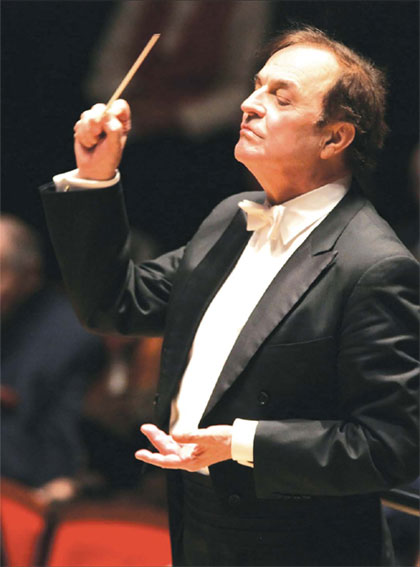
Charles Dutoit, one of the first European conductors to visit China, has frequently collaborated with local musicians since the 1990s. Photos provided to China Daily
Swiss conductor Charles Dutoit and Chinese pianist Wang Yuja will perform classical works inspired by the ocean, taking audiences through rough seas and calm waters. Xu Jingxi reports in Guangzhou.
Swiss conductor Charles Dutoit will stage his collaboration with the UK's Royal Philharmonic Orchestra in Beijing on Friday and in Guangzhou on Sunday, joined by his longtime collaborator, Chinese pianist Wang Yuja. Dutoit first met Wang 10 years ago when she was 16. Her teacher at the Curtis Institute of Music in Philadelphia, Gary Graffman, who was also the instructor of Chinese pianist Lang Lang, asked the conductor to audition Wang.
"It was unbelievable. I found Wang to be such a rare talent, not only with incredible technical ability but, most importantly, with great musical sensitivity. She moved me with her playing in a very deep way," Dutoit recalls.
After the audition, he immediately hired Wang to perform her debut with the Boston, Chicago, Pittsburgh, Los Angeles, Zurich Tonhalle and Bologna orchestras. They have now staged more than 100 collaborations across the globe.
More recently, Wang made her Tokyo debut with Dutoit and the NHK Symphony at Suntory Hall.
The Swiss conductor and the Chinese pianist are a perfect match.
Dutoit's conducting is bold and dynamic, as if the 77-year-old has poured all his energy into the music, but there are still subtle depths to the tones and rhythms of his work. The imaginative conductor is good at visualizing music, describing tones with colors and adjectives for food, such as "creamy" and "buttered".
Wang's imaginative, unrestricted performances help Dutoit create vivid images for the audience.
The 27-year-old pianist has a wide range of musical interests. She loves jazz and is curious about rock and electronic music. She made a surprising debut record with famous label Deutsche Grammophon in 2009 focusing on modern music instead of classical.
Her deft interpretation of both dreamy melodies and brittle outbursts with clarity and detail led to Wang being nominated for a Grammy award for her first album.
Dutoit and Wang will present Tchaikovsky's stirring Piano Concerto No 1 during the first half of their concerts in Beijing and Guangzhou. In the second half, Dutoit, who is noted for his interpretations of French 20th century music, will mesmerize the audience with works by two French impressionists, Debussy's La Mer and the Suite No 2 of Ravel's ballet drama Daphnis et Chloe.
The contrast between the oceans depicted in La Mer and in German classical composer Mendelssohn's Overture: The Herbride, which opens the concert, will be a highlight.
While the rumbling notes in Mendelssohn's piece vividly evoke scenes of waves crashing against rocks that the composer saw on a trip to Scotland, the roaring sea becomes gentle and dreamy in Debussy's work.
"The French repertoire requires an evanescent outlook, very magical and colorful. The German repertoire needs a different sound, more present and substantial," Dutoit says.
"The sound of an orchestra is important to me, and I do spend a lot of time working on the different aspects of sounds. Sound corresponds to the style of music and demonstrates the versatility of an orchestra."
Dutoit is one of the first European conductors to visit China. In 1996, Dutoit made his debut in the country with the French National Orchestra.
